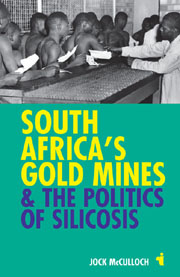Book contents
- Frontmatter
- Contents
- List of Photographs
- Preface: South Africa in the Twentieth Century
- Acknowledgments
- List of Abbreviations
- A Brief Chronology
- 1 Gold Mining & Life-Threatening Disease
- 2 Creating a Medical System
- 3 Compensation
- 4 A White Science
- 5 Myth Making & the 1930 Silicosis Conference
- 6 Tuberculosis & Tropical Labour
- 7 Conflict over the Compensation System
- 8 Healing Miners
- 9 The Sick Shall Work
- 10 Men Without Qualities
- Select Bibliography
- Index
4 - A White Science
Published online by Cambridge University Press: 05 February 2013
- Frontmatter
- Contents
- List of Photographs
- Preface: South Africa in the Twentieth Century
- Acknowledgments
- List of Abbreviations
- A Brief Chronology
- 1 Gold Mining & Life-Threatening Disease
- 2 Creating a Medical System
- 3 Compensation
- 4 A White Science
- 5 Myth Making & the 1930 Silicosis Conference
- 6 Tuberculosis & Tropical Labour
- 7 Conflict over the Compensation System
- 8 Healing Miners
- 9 The Sick Shall Work
- 10 Men Without Qualities
- Select Bibliography
- Index
Summary
In Southern Africa a range of physicians saw at first hand the impact of silica dust on gold miners. They included mine medical officers who conducted pre-employment, periodic and exit medicals at the Witwatersrand Native Labour Association (WNLA) compound or at individual mines, the interns at the Miners' Phthisis Medical Bureau (MPMB) who adjudicated compensation claims, and government doctors in the labour-sending States of Basutoland, Nyasaland and Mozambique who saw the effects of mining on migrant workers. In addition there were scientists at the South African Institute of Medical Research (SAIMR) in Johannesburg who conducted research on silicosis. Finally, there were specialists in the Department of Health who treated miners at public hospitals for diseases including tuberculosis. Of all those physicians, mine medical officers were in the most ambiguous position. They were best situated to identify and therefore prevent occupational disease, but their ability to intervene was compromised by the terms of their employment.
The scientific community in Johannesburg, like the various commissions of inquiry and the legislators in Pretoria, relied upon the data produced by the MPMB for understanding the risks facing gold miners. Unfortunately, the data had two serious limitations. In adjudicating compensation claims and thus producing the official disease rates, the Bureau relied upon the referrals of mine medical officers. Secondly, the system of medical surveillance generated almost no data on the post-employment health of black miners. The lack of reliable data meant that scientific and public debate was carried out in a void.
- Type
- Chapter
- Information
- South Africa's Gold Mines and the Politics of Silicosis , pp. 55 - 73Publisher: Boydell & BrewerPrint publication year: 2012

